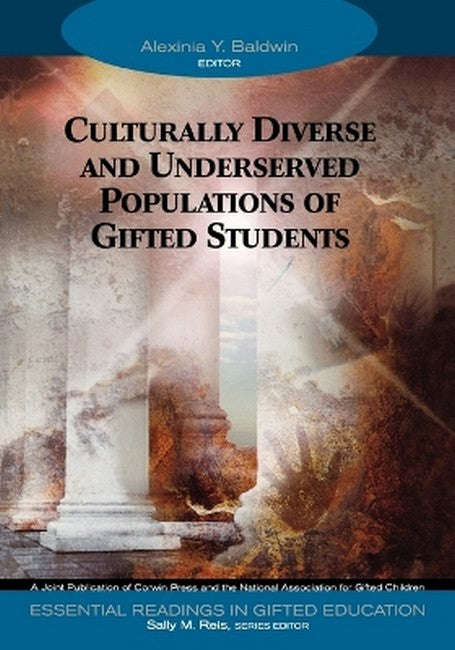Alexinia Y. Baldwin is a professor emeritus in the Department of Curriculum and Instruction at the University of Connecticut, Storrs. She is a specialist in Education of the Gifted with emphasis on the minority gifted child. Her arti-cles and chapters on this topic appear in many journals and textbooks. She developed the Baldwin Identification Matrix, which is used by many school districts and has co-edited a text titled The Many Faces of Giftedness: Lifting the Masks. Her professional background and some of her many activities are B. S., Tuskegee University; M.A., University of Michigan; Ph.D., University of Connecticut; classroom teacher of music, physical education, teacher of the gifted; Associate Professor, State University of New York, Albany; Director of International Teacher Education Program with University of Manchester, England; professor and department head, Department of Curriculum and Instruction, University of Connecticut; President, The Association for Gifted (TAG) 1978-1979; U.S. Delegate to the World Council for Gifted and Talented, 1981-2003; board member, National Association for Gifted Children; associate editor, Journal for Exceptional Children; International President of Altrusa International Inc. 1999-1997; Teacher of the Year award for the Association for Gifted and Talented in the State of New York (AGATE) given in her name. Sally M. Reis is a professor and the department head of the Educational Psychology Department at the University of Connecticut where she also serves as principal investigator of the National Research Center on the Gifted and Talented. She was a teacher for 15 years, 11 of which were spent working with gifted students on the elementary, junior high, and high school levels. She has authored more than 130 articles, 9 books, 40 book chapters, and numerous monographs and technical reports. Her research interests are related to special populations of gifted and tal-ented students, including: students with learning disabilities, gifted females and diverse groups of talented students. She is also interested in extensions of the Schoolwide Enrichment Model for both gifted and talented students and as a way to expand offerings and provide general enrichment to identify talents and potentials in students who have not been previously identified as gifted. She has traveled extensively conducting workshops and providing profes-sional development for school districts on gifted education, enrichment programs, and talent development programs. She is co-author of The Schoolwide Enrichment Model, The Secondary Triad Model, Dilemmas in Talent Development in the Middle Years, and a book published in 1998 about women's talent development titled Work Left Undone: Choices and Compromises of Talented Females. Sally serves on several editorial boards, including the Gifted Child Quarterly, and is a past president of the National Association for Gifted Children.
Request Academic Copy
Please copy the ISBN for submitting review copy form
Description
About the Editors Series Introduction - Sally M. Reis Introduction to Culturally Diverse and Underserved Populations of Gifted Students - Alexinia Y. Baldwin 1. I'm Black But Look At Me, I Am Also Gifted - Alexinia Y. Baldwin 2. Challenging Expectations: Case Studies of High-Potential, Culturally Diverse Young Children - Carol Ann Tomlinson, Carolyn M. Callahan, and Karen M. Lelli 3. Identifying Cognitively Gifted Ethnic Minority Children - Marcia Strong Scott, Lois-Lynn Stoyko Deuel, Beda Jean-Francois, and Richard C. Urbano 4. Dynamic Assessment and Its Use With Underserved Gifted and Talented Populations - Robert J. Kirschenbaum 5. Defining Belief in Self: Intelligent Young Men in an Urban High School - Thomas P. Hebert 6. Jermaine: A Critical Case Study of a Gifted Black Child Living in Rural Poverty - Thomas P. Hebert, Teresa M. Beardsley 7. The Nature and Extent of Programs for the Disadvantaged Gifted in the United States and Territories - James M. Patton, Douglas Prillaman, and Joyce VanTassel-Baska 8. The Seven Plus Story: Developing Hidden Talent Among Students in Socioeconomically Disadvantaged Environments - Alexinia Y. Baldwin 9. Perceived Factors Influencing the Academic Underachievement of Talented Students of Puerto Rican Descent - Eva I. Diaz 10. Economically Disadvantaged Students in a School for the Academically Gifted: A Postpositivist Inquiry Into Individual and Family Adjustment - James H. Borland, Rachel Schnur, and Lisa Wright Index

